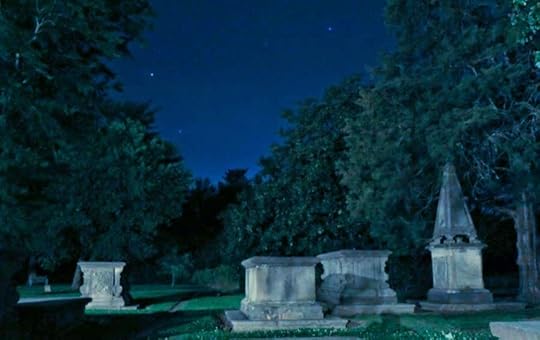Robin Williams, and thoughts on suicide
 Midnight, in the graveyard at Bruton Parish Church in Virginia
Midnight, in the graveyard at Bruton Parish Church in VirginiaThis morning I awoke to the news that comedian Robin Williams had killed himself, at 63. He’s the latest of a long line of creative people to take his own life. Every time a performer or artist kills himself I ask if this is an unavoidable hazard of the arts, or if something might be done about it.
News sources say Williams was “wrestling with depression” when he did himself in. I myself have wrestled with depression, as have many people around me. The question of why some of us choose suicide, successfully and without warning, is one that has yet to be answered.
Most of the people who commit suicide don’t announce their intentions. Some research suggests they may not even have such intentions until the fateful moment. I don’t have any wisdom to offer in that regard; it’s perhaps one of those things where the only ones who know the answers are dead.
I know I’m a part of two communities at risk. The suicide rate among people with autism is shockingly high – near 2% http://jerobison.blogspot.com/2014/05/what-happens-to-autistic-people-when-we.html
Some researchers speculate that autism isolates us, and isolation is painful. Autistic people are often subject to bullying, marginalization, and other painful things. I can understand how some of us are overwhelmed by that mix.
It's easy to start feeling we have nothing to look forward too except more psychic pain, and if we feel that way suicide may seem like a good choice. I do not feel that way right now, but I have been there before, and I can't think of anything that magically "snapped me out of it. From my experience, I can see how this state of mind would become unsustainable after a certain period of time. Yet it's a quiet despair, and I don't think most people noticed when I was feeling that way.
That's the danger of those kind of feelings - no one knows. We don't show much outward sign, and if we don't get better on our own . . .
When I was alone as a young adult I used to feel terrible pain and despair, almost every night. I'm all too aware that those feelings can return any time, should something bad enough happen. We're a vulnerable population in that respect. Some people say sadness strengthens and shapes us; others say it kills us. I guess it's situational.
Another study – this one dating from 1999 – found a similarly high rate among writers, sculptors, actors and other artists: http://www.amsciepub.com/doi/abs/10.2466/pr0.1999.84.1.291?journalCode=pr0
Are artists susceptible because we are sensitive to perceived criticism? Are artists isolated by difference? I don’t know. I know many writers who are absolutely devastated by attacks on their work. I’ve felt that myself, with some of the one-star reviews on Amazon. Does that lead to suicide? I don’t think anyone knows.
I know many writers and artists who seem to experience greater highs and lows than the average person. Maybe the highs bring us our gifts, but the lows can take us out. That's another unanswered question.
As a person who is often out there before the public, I know well the pressure to put on a happy face even when I'm crying inside. That puts a tremendous strain on the psyche, and it sometimes hammers you hard when you're alone after the show. When people look to you with certain expectations - whether you're a comedian like Robin, or a singer, or a speaker on disability - you are always feeling you must live up to an imaginary standard and it can be very hard. At the same time, you offer your inner thoughts - even if couched as comedy - and it stings when they're rejected. Is too much of that the straw that breaks the camel's back? Those of us who are living may never learn that particular answer.
I don't feel sad today - I am not writing from a place of despair - but I am well familiar with how that feels. It's heartbreaking to read stories like this one, and realize it could be any of us, tomorrow, with a few little disasters to put us over the edge.
The suicide rate for people with severe psychiatric disorders – mania, psychosis, schizophrenia, major depression – is even higher – near 10%. The 1999 study draws that comparison. I think of my parents, locked in the wards of the Northampton State Hospital 40 years ago. I remember seeing them among the other inmates and I understand. They were a desert of lost people.
Is there anything we might do to reduce rates of suicide in these groups? I wasn't personally acquainted with Robin Williams, but the news of his death reminds me how sad it is that we can be so silently alone and in pain - even when we are loved by millions as he was. And our sadness can be such a crushing burden that we take our own lives rather than carry on, even as observers of our lives imagine things to be so good. And it can happy to any of us - rich or poor, famous or unknown.
I’d be interested in your thoughts.
John Elder Robison is an autistic adult and advocate for people with neurological differences. He's the author of Look Me in the Eye, Be Different, Raising Cubby, and the forthcoming Switched On. He's co-founder of the TCS Auto Program high school in Springfield, MA and Neurodiversity Scholar in Residence at the College of William & Mary in Williamsburg, VA.(c) 2007-2011 John Elder Robison

Published on August 12, 2014 13:12
No comments have been added yet.



